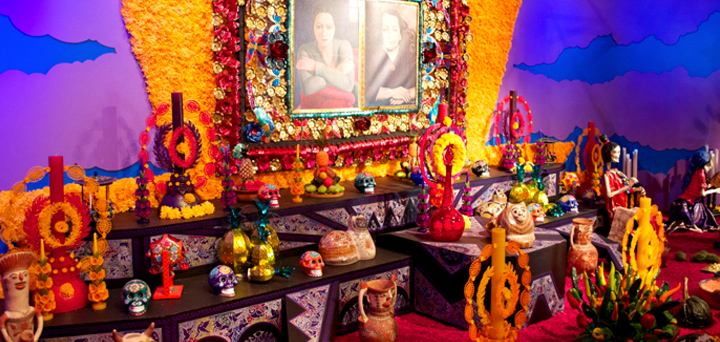Day of the dead in Mexico, autumn 2018.

The day of the Dead is a Mexican celebration of pre-hispanic origin, where the deceased are honored, nowadays they also incorporate elements of Catholicism and even modern touches.
The origin of this day is that pre-hispanic cultures shared the belief that there is a psychic and immortal entity that gives consciousness to the human being and that after death continues its path in the world of the dead, where it still needs utensils, tools and food.
This celebration is characterized as both religious and traditional, during the days 1st and 2nd of November special masses are offered for the deceased or people go to the cemeteries to visit their loved ones and/or some other families make altars in their houses where they put a photograph of the deceased in the highest part of the altar, surrounded by their favorite foods and surrounded by all the symbology that represents an altar of Dead.
As it is traditional, on the day of the dead the altars are made to those special beings that were part of our lives or to celebrities. The altar is formed by many elements, such as water, candles, candle-makers, copal and incense, flowers, bread, photographs, candies, food, liquor, skulls of sugar or chocolate.
In Mexico it is characteristic that this great celebration is different in each state of the Mexican Republic and each town has its own traditions and its own uses, in Mexico City parades are performed with Alebrijes at Reforma Avenue that is also stage of the night Walk in costumes on bicycle or to see a rain of marigolds, one of the places where it is a tradition this celebration is San Andrés Mixquic (means “place of the one who cares the water”), each year is organized the day of Dead, is one of the places in Mexico with more visitors during the day of the dead, this magical town of the Tláhuac delegation receives its deceased with the traditional offerings and “the enlightenment “.
The “enlightenment” is where a tribute is paid to the beings who left a memory in this world. From 19:00 hours, the cemetery is enlightened with candles, and the tombs adorned with flowers arrive the relatives of the dead to accompany them and let them know that they will be welcome in the future.
During 2017, these celebrations left an income of 16,793 billion pesos approximately, consequently increasing the sales in shops like the bakeries, fruit shops, flower shops, confectioneries, costume stores, groceries among other trades, while mentioning visitors from other states or Countries.
The Federal government stressed the importance of disseminating the traditions of the popular culture of our country as these days of the dead festivities, which are a great attraction for national and foreign Tourism.

